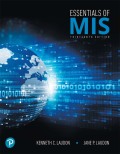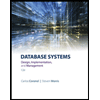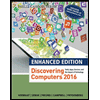
EBK ESSENTIALS OF MIS,
13th Edition
ISBN: 8220106778494
Author: LAUDON
Publisher: PEARSON
expand_more
expand_more
format_list_bulleted
Concept explainers
Expert Solution & Answer
Chapter 9, Problem 3RQ
Explanation of Solution
Customer relationship management:
- Customer relationship management is a methodology that manages an organization’s communication with their customers.
- This method uses client’s history with the company to improve business relationships.
- Modern customer relationship management constructs sustainable enduring customer relationships that generate value for company and customers.
Customer relationship management important to an organization:
- Without customers, a business cannot function...
Explanation of Solution
Partner relationship management:
- Partner relationship management is a mixture of software, plans, concepts, procedures that are used by corporations to modernize business process with partners who vend their products and services.
- A successful partner relationship management creates partnership between dealers and vendors that makes a profitable relationship...
Explanation of Solution
Tools and capabilities of CRM software for sales, marketing and customer service:
- CRM is sales department: Sales department uses CRM by the following ways:
- Customer service and support: It contains a wide range of customer services that helps the customers in making a cost effective and correct use of the products. It also contains planning, training, upgrading, maintaining the products.
- Sales force automation: It is a type of program that automates business tasks like controlling inventory, sales processing, tracing the interactions of customers and analyzing the performance.
- Contact management CRM: It is a type of CRM system that provides faster access to contact information of customers. It is often used with e-mail integration and activity management.
- Opportunity management CRM: This type of CRM tool aids to manage the sales opportunities and generates accurate forecasts for the business. It organizes key sales information that is important to maximize the leads...
Explanation of Solution
Differences between Operational CRM and Analytical CRM:
| Operational CRM | Analytical CRM |
| This system is used to support front-office (direct interaction with customers) business processes. | This system analyzes customer behavior and provides business intelligence. |
| It is very efficient and it provides 3600 view of customers, personalized marketing, etc... |
Expert Solution & Answer
Want to see the full answer?
Check out a sample textbook solution
Students have asked these similar questions
You will write a program that allows the user to keep track of college locations and details about each location. To begin you will create a College python class that keeps track of the csollege's unique id number, name, address, phone number, maximum students, and average tuition cost.
Once you have built the College class, you will write a program that stores College objects in a dictionary while using the College's unique id number as the key.
The program should display a menu in this order that lets the user:
1) Add a new College
2) Look up a College
4) Delete an existing College
5) Change an existing College's name, address, phone number, maximum guests, and average tuition cost.
6) Exit the program
Show all the work
Construct a frequency polygon density estimate for the sample in Question 1, using bin width determined by Sturges’ Rule.
Chapter 9 Solutions
EBK ESSENTIALS OF MIS,
Ch. 9.2 - Prob. 1CQ1Ch. 9.2 - Prob. 2CQ1Ch. 9.2 - Prob. 3CQ1Ch. 9.2 - Prob. 4CQ1Ch. 9.3 - Prob. 1CQ2Ch. 9.3 - Prob. 2CQ2Ch. 9.3 - Prob. 3CQ2Ch. 9.3 - Prob. 4CQ2Ch. 9 - Prob. 1IQCh. 9 - Prob. 2IQ
Ch. 9 - Prob. 3IQCh. 9 - Prob. 1RQCh. 9 - Prob. 2RQCh. 9 - Prob. 3RQCh. 9 - Prob. 4RQCh. 9 - Prob. 5DQCh. 9 - Prob. 6DQCh. 9 - Prob. 7DQCh. 9 - Prob. 8HMPCh. 9 - Prob. 9HMPCh. 9 - Prob. 11HMPCh. 9 - Prob. 12CTPCh. 9 - Prob. 13CSQCh. 9 - Prob. 14CSQCh. 9 - Prob. 15CSQCh. 9 - Prob. 16CSQCh. 9 - Prob. 17CSQCh. 9 - Prob. 18MLMCh. 9 - Prob. 19MLM
Knowledge Booster
Learn more about
Need a deep-dive on the concept behind this application? Look no further. Learn more about this topic, computer-science and related others by exploring similar questions and additional content below.Similar questions
- [5 marks] Give a recursive definition for the language anb2n where n = 1, 2, 3, ... over the alphabet Ó={a, b}. 2) [12 marks] Consider the following languages over the alphabet ={a ,b}, (i) The language of all words that begin and end an a (ii) The language where every a in a word is immediately followed by at least one b. (a) Express each as a Regular Expression (b) Draw an FA for each language (c) For Language (i), draw a TG using at most 3 states (d) For Language (ii), construct a CFG.arrow_forwardQuestion 1 Generate a random sample of standard lognormal data (rlnorm()) for sample size n = 100. Construct histogram estimates of density for this sample using Sturges’ Rule, Scott’s Normal Reference Rule, and the FD Rule. Question 2 Construct a frequency polygon density estimate for the sample in Question 1, using bin width determined by Sturges’ Rule.arrow_forwardGenerate a random sample of standard lognormal data (rlnorm()) for sample size n = 100. Construct histogram estimates of density for this sample using Sturges’ Rule, Scott’s Normal Reference Rule, and the FD Rule.arrow_forward
- Can I get help with this case please, thank youarrow_forwardI need help to solve the following, thank youarrow_forwardreminder it an exercice not a grading work GETTING STARTED Open the file SC_EX19_EOM2-1_FirstLastNamexlsx, available for download from the SAM website. Save the file as SC_EX19_EOM2-1_FirstLastNamexlsx by changing the “1” to a “2”. If you do not see the .xlsx file extension in the Save As dialog box, do not type it. The program will add the file extension for you automatically. With the file SC_EX19_EOM2-1_FirstLastNamexlsx still open, ensure that your first and last name is displayed in cell B6 of the Documentation sheet. If cell B6 does not display your name, delete the file and download a new copy from the SAM website. Brad Kauffman is the senior director of projects for Rivera Engineering in Miami, Florida. The company performs engineering projects for public utilities and energy companies. Brad has started to create an Excel workbook to track estimated and actual hours and billing amounts for each project. He asks you to format the workbook to make the…arrow_forward
arrow_back_ios
SEE MORE QUESTIONS
arrow_forward_ios
Recommended textbooks for you
 Principles of Information Systems (MindTap Course...Computer ScienceISBN:9781285867168Author:Ralph Stair, George ReynoldsPublisher:Cengage Learning
Principles of Information Systems (MindTap Course...Computer ScienceISBN:9781285867168Author:Ralph Stair, George ReynoldsPublisher:Cengage Learning Principles of Information Systems (MindTap Course...Computer ScienceISBN:9781305971776Author:Ralph Stair, George ReynoldsPublisher:Cengage Learning
Principles of Information Systems (MindTap Course...Computer ScienceISBN:9781305971776Author:Ralph Stair, George ReynoldsPublisher:Cengage Learning Database Systems: Design, Implementation, & Manag...Computer ScienceISBN:9781305627482Author:Carlos Coronel, Steven MorrisPublisher:Cengage Learning
Database Systems: Design, Implementation, & Manag...Computer ScienceISBN:9781305627482Author:Carlos Coronel, Steven MorrisPublisher:Cengage Learning Enhanced Discovering Computers 2017 (Shelly Cashm...Computer ScienceISBN:9781305657458Author:Misty E. Vermaat, Susan L. Sebok, Steven M. Freund, Mark Frydenberg, Jennifer T. CampbellPublisher:Cengage Learning
Enhanced Discovering Computers 2017 (Shelly Cashm...Computer ScienceISBN:9781305657458Author:Misty E. Vermaat, Susan L. Sebok, Steven M. Freund, Mark Frydenberg, Jennifer T. CampbellPublisher:Cengage Learning Fundamentals of Information SystemsComputer ScienceISBN:9781337097536Author:Ralph Stair, George ReynoldsPublisher:Cengage Learning
Fundamentals of Information SystemsComputer ScienceISBN:9781337097536Author:Ralph Stair, George ReynoldsPublisher:Cengage Learning A+ Guide To It Technical SupportComputer ScienceISBN:9780357108291Author:ANDREWS, Jean.Publisher:Cengage,
A+ Guide To It Technical SupportComputer ScienceISBN:9780357108291Author:ANDREWS, Jean.Publisher:Cengage,

Principles of Information Systems (MindTap Course...
Computer Science
ISBN:9781285867168
Author:Ralph Stair, George Reynolds
Publisher:Cengage Learning

Principles of Information Systems (MindTap Course...
Computer Science
ISBN:9781305971776
Author:Ralph Stair, George Reynolds
Publisher:Cengage Learning

Database Systems: Design, Implementation, & Manag...
Computer Science
ISBN:9781305627482
Author:Carlos Coronel, Steven Morris
Publisher:Cengage Learning

Enhanced Discovering Computers 2017 (Shelly Cashm...
Computer Science
ISBN:9781305657458
Author:Misty E. Vermaat, Susan L. Sebok, Steven M. Freund, Mark Frydenberg, Jennifer T. Campbell
Publisher:Cengage Learning

Fundamentals of Information Systems
Computer Science
ISBN:9781337097536
Author:Ralph Stair, George Reynolds
Publisher:Cengage Learning

A+ Guide To It Technical Support
Computer Science
ISBN:9780357108291
Author:ANDREWS, Jean.
Publisher:Cengage,